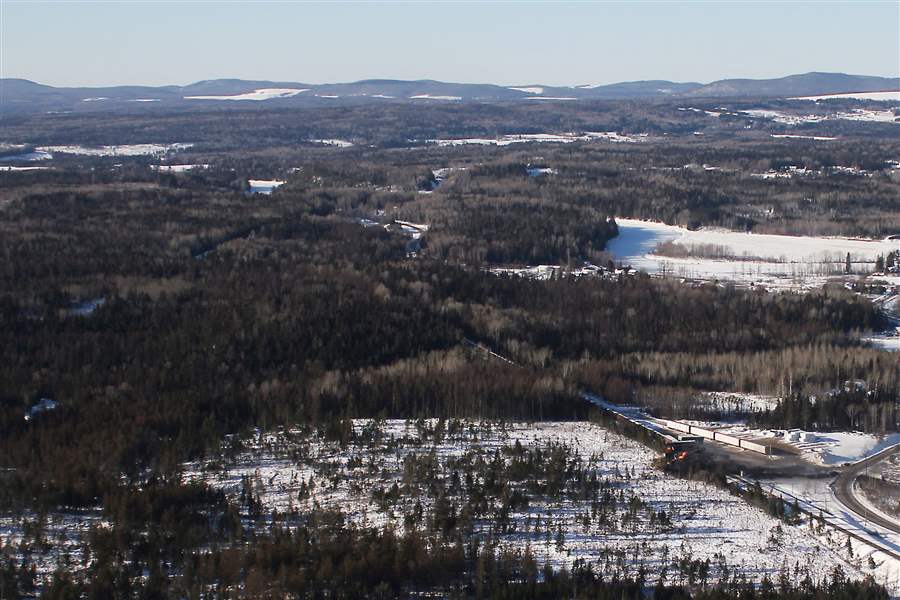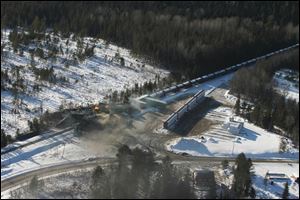
Cracked wheel, broken rail at Canada derailment
1/9/2014
This aerial photo shows derailed train cars burning in Plaster Rock, New Brunswick on Wednesday, Jan. 8, 2014. A Canadian National Railway freight train carrying crude oil and propane derailed Tuesday night in a sparsely populated region of northwestern New Brunswick. More than 100 residents remained evacuated from their homes. There were no deaths or injuries. (AP Photo/The Canadian Press, Tom Bateman)
ASSOCIATED PRESS

This aerial photo shows derailed train cars burning in Plaster Rock, New Brunswick Wednesday.
PLASTER ROCK, New Brunswick — Canada’s Transportation Safety Board said today a cracked wheel might have caused a train carrying oil to derail in New Brunswick, causing a large fire that continues to burn a day and a half later.
Lead investigator Guy Laporte said a crack in a wheel near the front of the train caused the wheel to loosen from the axel, resulting in the derailment of that wheel set.
But Laporte said it’s too early to determine what caused the train to leave the tracks late Tuesday derailed in the sparsely populated region roughly 20 miles from the U.S. border and northern Maine. No one was injured, but about 150 people living nearby were evacuated.
A Canadian National Railway spokesman, Jim Feeny, said the company believes a wheel and axle failure is the cause, based on its preliminary investigation.
Laporte said they also found a broken rail at the site, where 19 cars and a locomotive derailed.
Feeny said the priority is to extinguish the fire in three cars carrying crude oil and liquefied petroleum gas.
The incident again raised concerns about the increasing use of rail to transport oil throughout North America. In July, 47 people were killed in Lac-Megantic, Quebec, when a train carrying crude oil derailed and exploded in the middle of a small community.
A number of recent derailments in North America have worried both officials and residents close to rail lines. On Dec. 30, an oil train derailed and exploded in North Dakota, causing the evacuation of a nearby town but no injuries.
Canadian National Railway spokesman Mark Hallman declined to say if some of the crude oil being transported in this latest incident was Bakken crude, which may be more volatile than traditional oil. Hallman said two of the crude train cars came from Northern Alberta and three came from southwestern Manitoba and that the crude loaded in Manitoba came from Manitoba and Saskatchewan.
A safety alert recently issued by the U.S. Department of Transportation warns the public, emergency responders and shippers about the potential high volatility of crude from the Bakken oil patch. The sprawling oil shale reserve is fueling the surging industry in eastern Montana and western North Dakota, which is now America’s second-largest oil producer behind Texas. The Bakken oil region also extends into Canada.
Canadian Prime Minister Stephen Harper this week defended his government’s record on rail safety and inspections, saying it has “vastly” boosted spending in those areas. He said the government will look at any recommendations that may come from the Transportation Safety Board.